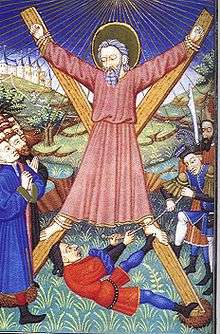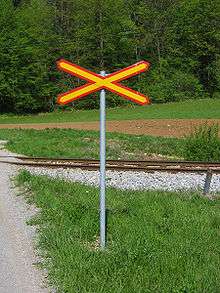aspa
Catalan
Further reading
- “aspa” in Diccionari de la llengua catalana, segona edició, Institut d’Estudis Catalans.
Icelandic
Irish
Declension
Declension of aspa
Fourth declension
|
Bare forms
|
Forms with the definite article
|
Mutation
| Irish mutation | |||
|---|---|---|---|
| Radical | Eclipsis | with h-prothesis | with t-prothesis |
| aspa | n-aspa | haspa | t-aspa |
| Note: Some of these forms may be hypothetical. Not every possible mutated form of every word actually occurs. | |||
Portuguese

Santo André crucificado numa aspa. (Saint Andrew crucified on a crux decussata.)

Aspa marcando um cruzamento de ferrovia. (Saint Andrew’s cross marking a level crossing.)
Pronunciation
Noun
aspa f (plural aspas)
- crux decussata (an X-shaped cross, used to crucify people)
- Saint Andrew’s cross (any X-shaped symbol)
- (heraldry) saltire (ordinary in the shape of an X)
- (typography) quotation mark; inverted comma (the character ‘, ’ or ')
- (typography, in the plural) quotation marks (the characters «» or “”)
- an animal’s horn
- sail (blade of a windmill)
Synonyms
- (crux decussata): cruz decussata
- (Saint Andrew’s cross): cruz de Santo André
- (saltire): sautor
- (horn): chifre, corno, guampa
Spanish
Pronunciation
- IPA(key): /ˈaspa/
- Hyphenation: as‧pa
Etymology 1
From Medieval Latin haspa, from Frankish *haspija, from Proto-Germanic *haspijǭ (“clasp; reel”). More at hasp.
Noun
aspa f (plural aspas)
- cross, St. Anthony's cross
- blade in windmills or wind turbines
- z-shaped figure
- spool, reel (yarn)
- wheel
- vane, sail (of windmill)
- (mining) intersection of two veins
- (South America) horn
- (heraldry) saltire
- hasp
Usage notes
- The feminine noun aspa is like other feminine nouns starting with a stressed a sound in that it takes the definite article el (normally reserved for masculine nouns) in the singular when there is no intervening adjective:
Etymology 2
See the etymology of the main entry.
Verb
aspa
Further reading
- “aspa” in Diccionario de la lengua española, Vigésima tercera edición, Real Academia Española, 2014.
This article is issued from
Wiktionary.
The text is licensed under Creative
Commons - Attribution - Sharealike.
Additional terms may apply for the media files.